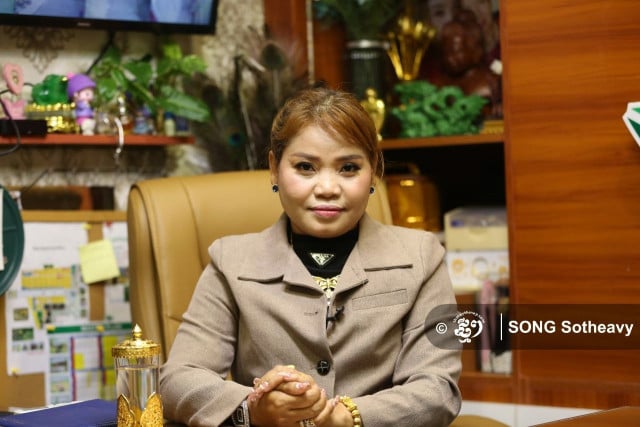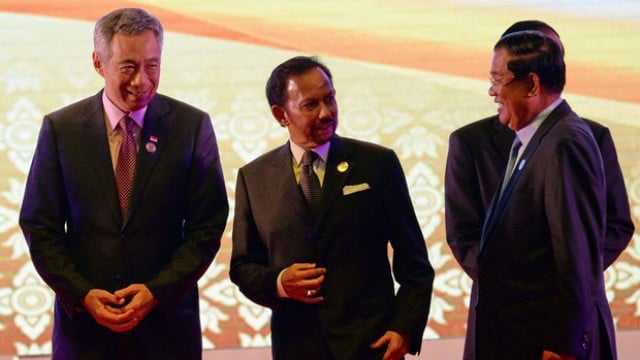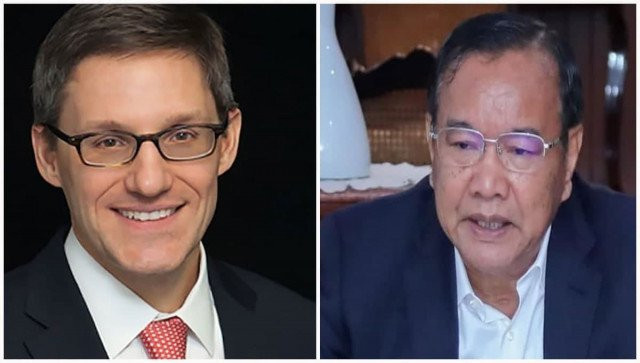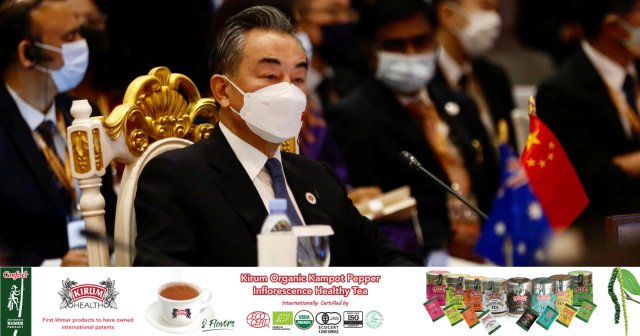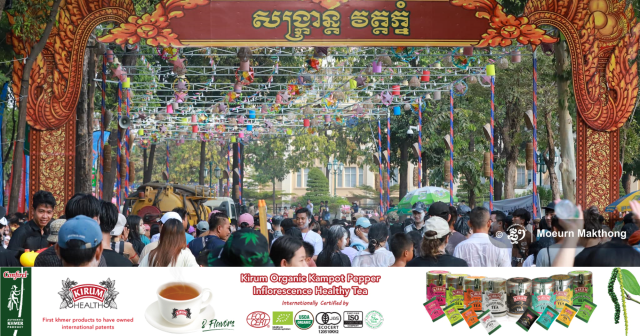Kem Ley’s Memorial: A Day of Peaceful Gathering Interrupted
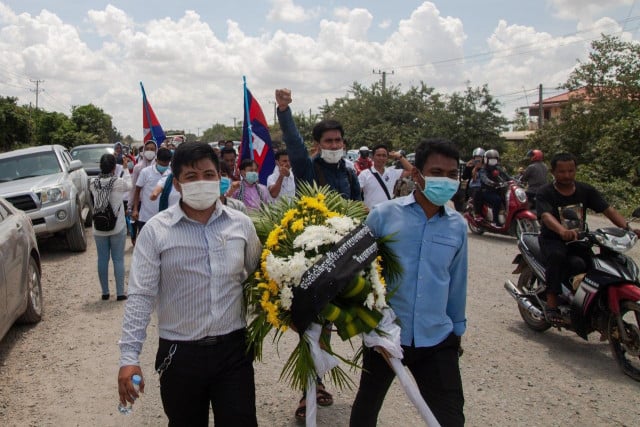
- Vantha Phoung and Gerald Flynn
- July 11, 2020 3:52 AM
Four years after his death, Kem Ley still inspires Cambodians to shape their country’s destiny. Many Cambodians celebrated Kem Ley’s memory in spite of the authorities’ interference.
TAKÉO--At the intersection of Mao Tse Tung and Monivong boulevards in Phnom Penh, the Caltex petrol station sat quiet on the morning of July 10—save for a small army of police, who stood about joking and smoking in the forecourt. Four years prior, the petrol station had been the site of Dr. Kem Ley’s murder. The famed political analyst and outspoken critic of Cambodia’s politicians had been drinking a coffee on that morning of July 10, 2016, when he was shot dead. The killer was reportedly seen escaping on a police motorbike, but the crime was pinned on a forest ranger and former soldier named Oeuth Ang who received a life sentence in March 2018.
Kem Ley, who was also a physician, had, just days before he was gunned down, been speaking on Radio Free Asia about a report released by British-based anti-corruption organization Global Witness. The report uncovered the vast personal wealth Prime Minister Hun Sen’s family. Despite Oeung Ath taking the blame, when he initially identified himself as “Chuob Samlab”—which translates to “Meet to Kill”—many people began to suspect Kem Ley was not, as the court found, killed over an unpaid debt. Testimony from his family also disputed this theory, although Kem Ley’s wife and children fled Cambodia and spent a year in Thailand before being granted asylum in Australia in February 2018.
Much has changed in Cambodia since Kem Ley’s death, but the annual memorials on July 10 have remained a constant. In 2019, the government deployed militarized security forces to deter and disrupt the proceedings, leading to several arrests—most notably of Kong Raiya, an activist who was selling t-shirts with Kem Ley’s image and quotes printed on them. Raiya was charged with incitement to commit a felony in July 2019. But this year’s memorial events were disrupted before they began.

The Caltex were Kem Ley was murdered stood empty save for police and security forces on July 10, 2020.
On July 8, 2020, a group of activists and monks were blocked by the authorities as they attempted to perform a Buddhist memorial at the Caltex petrol station where Kem Ley was killed. The leader of the group, Hun Vannak, was reportedly chased from the premises despite the group saying they were committing no crime. The next day, a group of 30 non-governmental organizations (NGOs) and civil society groups released a joint statement calling for an independent inquiry into Kem Ley’s death.
While previous years have seen large gatherings at the Caltex station in Phnom Penh and marches that followed the path along which Kem Ley’s body was carried back to his hometown in Takeo province, the memorial of July 10 this year was markedly muted. Police had all but fortified the intersection with armed uniformed officers stationed on every corner, down every alleyway, and plain clothes officers sitting surreptitiously in nearby cafes, all waiting for any sign of activists looking to celebrate the life of Kem Ley. Evidently, the tactic worked and, by 10 a.m., it became apparent that no such event was taking place at Caltex.
Still, activists, supporters of Kem Ley and representatives from a range of civil society organizations could not be deterred.
As police blocked some 19 tuk-tuks and a bus from heading to Kem Ley’s family home in Takeo Province, many of the passengers simply got out to make the remaining 10 kilometers of the journey on foot. In what may be an apt metaphor for the government’s growing intolerance for dissent, the local authorities attempted to drown out the memorial service by taking control of nearby megaphones, shouting over a peaceful ceremony in the privacy of Kem Ley’s family home.
Silencing Dissent
The waning patience for critics was catalogued extensively in a new report released by the Observatory for the Protection of Human Rights Defenders; a partnership between the International Federation for Human Rights (FIDH) and the World Organisation Against Torture (OMCT). Published on July 9, the report details alleged abuses—some legislative, others more rooted in police intimidation and harassment—but provides an almost encyclopedic compendium of what it claims are the Cambodian government’s attempts to curtail the freedoms and rights of the people it purports to represent.
“The mission found that human rights defenders including cyber activists, land and environmental rights defenders, and labour leaders, as well as journalists, had come under attack by state actors. Human rights-related events including peaceful demonstrations and training workshops had been monitored and interfered with by government authorities,” the report reads, detailing how the Cambodian People’s Party (CPP) dominated National Assembly has adopted legislation that silences human rights defenders.
“[R]enew police and judicial investigations into all murders of human rights defenders in Cambodia since 1993, including: political analyst Kem Ley; trade union leaders Messrs. Chea Vichea, Ros Sovannareth, and Hy Vuthy; and environmental activist Chutt Wutty,” the report stated as one of the many recommendations it made to the Cambodian government.
Kem Ley’s 79-year-old mother, Phok Se, explained how the four years that have passed since her son’s murder haven’t felt real.
“I miss him so much, it feels like yesterday that he was taken, but I feel proud of my son,” she said. “Even on the fourth anniversary of his death, so many people still come to pay their respects. I didn’t prepare any invitations: People came because they praise him, they tell me he was a good man.”
Her son’s death has impacted Se’s life in a multitude of ways. While she is grateful for the well-wishers who stop by to talk with her when passing through, her son’s absence has made her life much harder in practical terms.
“He supported me,” Se explained, adding that now she grows some vegetables to feed herself as her youngest son earns just enough to support his own family.
“I pray they find whoever really did it, but I’m too old to take action, so I leave that to others,” she said before going to greet the new arrivals.
Despite the delays caused by police interference, the passengers from the waylaid bus and tuk-tuks on July 10 could be heard chanting “Kem Ley! Justice for all!” as they approached the family home of the fallen icon. Strolling down the dusty road, the crowd waved Cambodian flags, punching the air—galvanized by the life and death of their hero. Traffic police gathered but, when questioned about their intentions, said that they only wanted to ensure that vehicles moved around the parade safely and that they had no idea who had authorized the road block 10 kilometers up the road or why. Shortly prior to the arrival of the crowd a large truck of uniformed police officers had sped by Kem Ley’s home in the direction of Phnom Penh.
“We’re sorry we’re late, the police had us blocked for trying to pay our respects,” said one of representatives from the Independent Democracy of the Informal Economy Association (IDEA) who had been one of the tuk-tuk driver ferrying people from the capital to Takeo.
“We wish Kem Ley was still alive, he taught us how to love the country and how to resolve conflict between Khmer people, we still remember all the hard work he did for this country and we hope to embody the heart of Kem Ley,” he said to a packed crowd of mourners at the family home memorial.
Another IDEA tuk-tuk driver, Eng Sokkors, described how the group had left Phnom Penh at 6 a.m. and arrived at the roadblock at 10.30 a.m. but were only able to make it to the memorial service at 1 p.m. due to a two hours holdup while police checked the temperature of passengers and the licenses of drivers.
“The police deliberately tried to obstruct us, they were only blocking IDEA members—everyone else was allowed through—so we tried to find another way around while the passengers got out and walked the 10 kilometer journey here,” said Sokkors.
Gatecrashing the Memorial for Kem Ley
Following the brief speeches from IDEA members, Chak Sopheap—executive director of the Cambodian Center for Human Rights—gave an interview with VOD but was swiftly interrupted by local authorities.
“The commemoration of Kem Ley has ended, for other people who stay longer or are coming for other reasons do not commemorate Kem Ley,” said an unnamed representative from the local authorities. “I request you that, for your Facebook livestreams and interviews, you can do it outside the house,” he said while being flanked by a cadre of men filming everything on mobile phones. People wishing to commemorate Kem Ley's life stream into his house on July 10, 2020.
People wishing to commemorate Kem Ley's life stream into his house on July 10, 2020.
Kem Rithysith, Kem Ley’s younger brother, said that Kem Ley's family had requested the authorities to ensure that the Buddhist ceremony to commemorate his brother’s passing remained a half-day event and that there would be no interviews or speeches during the event.
“I was interviewed by VOD and then the local authorities told me I couldn’t speak to them,” explained Sopheap. “They asked the family to speak—I know [the family] was under pressure from the authorities to speak and I don’t want to cause problems for [the family].”
“It has been emotional, when it comes to July 10, because we all know that the man who had been speaking the truth to power was gunned down in broad daylight and, for four years now, justice remains elusive,” she said, adding that people had come simply to pay respect to the memory and wisdom of Kem Ley.
For Sopheak, the gauntlet laid down by the authorities only reaffirm the value of Kem Ley’s ideals. She remains inspired by the number of people who show their support to such ideals, she said. As she walked past the police roadblock among roughly 100 people, she mentioned how street vendors showed their support by handing out coconuts to supporters of Kem Ley.
“Even though the authorities tried to stop us, we witnessed the kindness and solidarity of the people, I think they have a very warm heart and it sends a message that they are with us and they pay their respects to Kem Ley,” she said. “It’s a very sad day, but it’s a very inspiring moment to see how people come together and commemorate the day together.”
Sopheap urged the government to establish an independent inquiry into Kem Ley’s death, noting that the current uncertainties surrounding his death—even four years on—has only led more people to seek awareness of their rights. These are rights, she said, are being eroded by the government’s actions.
“The government, when it comes to civil rights, seem to have an allergic reaction—I don’t know what causes that allergy, but I believe in a democratic society,” she said.
Sopheap added that she hopes to see a Cambodia where people can voice their concerns and troubles to a government who might actively seek a solution, but warned that the current failure to do so will only lead to more social chaos.
“People’s problems do not go away just because the government can’t see them,” she said. “In Cambodia, we claim ourselves as a democratic society, so those freedoms need to be not just respected, but protected and that is the obligation of the government based on the domestic and international laws.”
Crackdown Intensifies Dedication of Human Rights Defenders
The sentiments of Sopheap were echoed throughout the memorial, which—as an event—provided a platform for an exchange of ideas and ideals among a diverse range of Cambodian intellectuals.
“It’s become stricter and more arbitrary since last year,” noted Yeng Virak, president of the Grassroots Democratic Party—the political party that Kem Ley had been a co-founder to in June 2015.
 President of the Grassroots Democratic Party, Yeng Virak. Photo by Phoung Vantha.
President of the Grassroots Democratic Party, Yeng Virak. Photo by Phoung Vantha.
Virak complained of the lack of reasoning given by the police for their roadblocks. He argued that, given the government’s power, they should have the capacity to understand the collective need to heal following the death of Kem Ley and that the events of July 10 were crucial to that.
He told of the authorities telling the family of Kem Ley to pack up their folding tables and chairs so that guests would not have anywhere to commemorate him: This, he predicted, would only intensify people’s love and commitment towards the public figure.
“People are just here to pay their respects,” he said. “Nobody will commit any illegal acts—it’s just [the government’s] assumptions and fears that make them want to shut it down, it’s not fair. We’ve even told them they can stay to observe, but nobody has done anything illegal—it’s bizarre.”
For Virak and his party, the resilience of those who made it was a sign of better things to come, but he cautioned that such dedication must expand beyond one annual event and that positive change in Cambodia depended on the sustained engagement of all Cambodians.
“If you look at the trends of human rights abuses, the people must exercise and use their rights to vote in someone who is a proper public servant, who truly serves the public,” he asserted, adding that he felt more people are aware of their rights as a direct result of the CPP-led government abusing them.
“Any government that can do without an election will do, but here—by law—they must hold one every five years and so it’s up to us, all of us, to participate. I you stay home and don’t vote, you allow the status quo to continue,” he said.

Sar Mory, a research and advocacy program manager at the Cambodian Youth Network. Photo by Phoung Vantha
Frustrated by the challenges he and his colleagues had faced in simply attending a peaceful memorial, Sar Mory—a research and advocacy program manager at the Cambodian Youth Network—questioned why the authorities were so intent on denying him and his fellow Cambodians such right.
Citing the Cambodian constitution, various international treaties that Cambodia is a signatory to and domestic legislation, Mory reasoned that it was perhaps out of paranoia on the government’s behalf that his group was initially blocked from attending.
“I don’t know why they decided to ban our bus and our youth group,” he said while sitting in Kem Ley’s house. “I can see that there is a systematic intention to prevent all Kem Ley supporters from celebrating together—all these gatherings will continue the legacy of Kem Ley’s heroism, we keep it alive in the heart of Cambodians.”
Participation Key to Political Change
He noted that the assassination of Kem Ley had precipitated a major reactionary period for the government that has resulted in a shrunken civic space with fewer freedoms for Cambodians. This, he said, was evident in the government’s prosecution of Raiya’s t-shirt sales at the 2019 Kem Ley memorial.
“It’s purely strength and power on the government’s side: I think they’re paranoid and don’t want to see any form of gathering,” he mused.
As with Virak, Mory does not see Cambodia’s political environment as an insurmountable challenge, despite the government’s efforts to silence him.
“The future of human rights and democracy in Cambodia depends on the participation of young people,” he said. “Today, we see more young people with access to information, more young people get a higher education and I believe that their participation can create positive changes. It can open up democracy. I saw after Kem Ley’s death, there were more young people standing up against the intimidation of the authorities.”
 While Kem Ley is gone, his memory remains and is celebrated by Cambodians on the fourth anniversary of his death. This statue and portrait stand in his house in Takeo province.
While Kem Ley is gone, his memory remains and is celebrated by Cambodians on the fourth anniversary of his death. This statue and portrait stand in his house in Takeo province.
Although unable to attend the memorial in Takeo, President of the Kem Ley Foundation, Sao Kosal, strongly condemned the government’s actions on the fourth anniversary of the political analyst’s death.
“People have started to exercise and claim their rights to participate in social development,” he said in a message. “They are actively against corruption and social injustice, they follow Kem Ley’s words and I hope they will use them to change the leadership of Cambodia in free and fair elections where the rule of law and democracy is applied.”
Kosal’s organization recently issued a statement about the disruption of the memorial events planned in Phnom Penh. The statement also even alleged that the authorities had offered the wife and children of Kem Ley a $4 million package to move back to Cambodia on account of the slain activist’s international standing. This package, Kosal asserted, included a luxurious villa. The corruption of such an offer is everything that Kem Ley stood against, he added.






